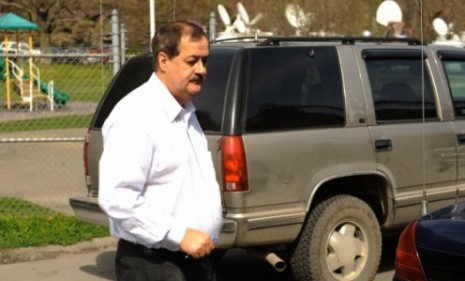The Massey disaster: Is 'Coal Baron' Don Blankenship to blame?
The CEO of Massey Energy is emerging as a villain in the tragedy of the Upper Big Branch mine disaster. Why?

Don Blankenship, the 60-year-old chief executive of Massey Energy, is rapidly becoming the perceived villain in the West Virginia coal mining disaster that killed at least 25 people this week. Massey's 42 coal mines — including Upper Big Branch, where the deadly explosion occured — have received more than 2,000 safety violations this year. An unapologetic free marketeer, Blankenship has been accused by critics of putting the company's bottom line ahead of worker safety. Some commentators are even calling for him to be charged with murder. (Watch the Massey CEO talk about "nonsensical" safety rules.) Here's a look at the "Coal Baron" of Appalachia — and why everyone is blaming him for the disaster:
Who is Don Blankenship?
Donald L. Blankenship is the chief executive of Massey Energy Company, owner of the Upper Big Branch mine, which exploded this week. He joined the firm as a manager in 1982, and worked his way to the top. Including stock options, he was paid more than $19 million by Massey in 2008.
The Week
Escape your echo chamber. Get the facts behind the news, plus analysis from multiple perspectives.

Sign up for The Week's Free Newsletters
From our morning news briefing to a weekly Good News Newsletter, get the best of The Week delivered directly to your inbox.
From our morning news briefing to a weekly Good News Newsletter, get the best of The Week delivered directly to your inbox.
Why are people blaming him for the disaster?
The Upper Big Branch mine has received 124 safety violations this year, and Massey's 41 other coal mines in the area have racked up more than 2,000 violations this year between them. Critics say Blankenship's anti-union, anti-regulatory stance contributed to a culture of poor safety and health at the company.
What are his political views?
Considered the "ultimate free marketeer," Blankenship is vigorously opposed to government regulation of his industry. "Washington and state politicians have no idea how to improve miners' safety," he said at an anti-regulatory rally last September. "The very idea that they care more about coal miner safety than we do is as silly as global warming."
A free daily email with the biggest news stories of the day – and the best features from TheWeek.com
How does he treat workers?
The company tries to cultivate "camaraderie," according to Ian Urbina and John Leland in The New York Times. Massey miners are called "members," not employees. Some even fly the Massey flag in front of their homes. Blankenship rewards his workers, too: Last year he hosted a July 4 party on the grounds of his home, with entertainment from rocker Ted Nugent. Massey reportedly pays better than mines owed by other companies, but their benefits packages are smaller.
Is Blankenship a political contributor?
Yes. He contributed more than $30,000 to the National Republican Senatorial Committee last year, has supported Sen. James Inhofe (R-Okla.), and controversially donated $3 million to the campaign of a West Virginia judge who later helped overturn a $50 million judgement against Massey. The episode apparently formed the basis of John Grisham's 2008 legal thriller The Appeal.
Who does he think is to blame for the tragedy?
No one. In an interview with ABC, he said that life is inherently risky. "There's 42,000 people a year killed on the highways," he said. "So there's dangers in everything, and we're trying to minimize that danger as best we can." The numerous safety violations, he told other reporters, are "unfortunately a normal part of the mining process."
What does he think of the media coverage?
On his Twitter feed, which is "basically a string of zingers aimed at environmentalists, Democrats, and green-thinking Republicans," he has accused the media of "indignity" in its coverage of the disaster. Blankenship has had run-ins with the media before. In 2008, he warned an ABC cameraman that he would be shot for taking photos. (see video here)
What are his defenders saying?
Brian Glasser, a lawyer in Charleston who has brought suits against Massey, told The New York Times: "He honestly believes what he is doing is materially benefiting the lives of the people who work for him... To make him an enemy of the people is not fair to him."
-
 Political cartoons for January 24
Political cartoons for January 24Cartoons Saturday's political cartoons include 3D chess, political distractions, and more
-
 Ryanair/SpaceX: could Musk really buy the airline?
Ryanair/SpaceX: could Musk really buy the airline?Talking Point Irish budget carrier has become embroiled in unlikely feud with the world’s wealthiest man
-
 Claudette Colvin: teenage activist who paved the way for Rosa Parks
Claudette Colvin: teenage activist who paved the way for Rosa ParksIn The Spotlight Inspired by the example of 19th century abolitionists, 15-year-old Colvin refused to give up her seat on an Alabama bus